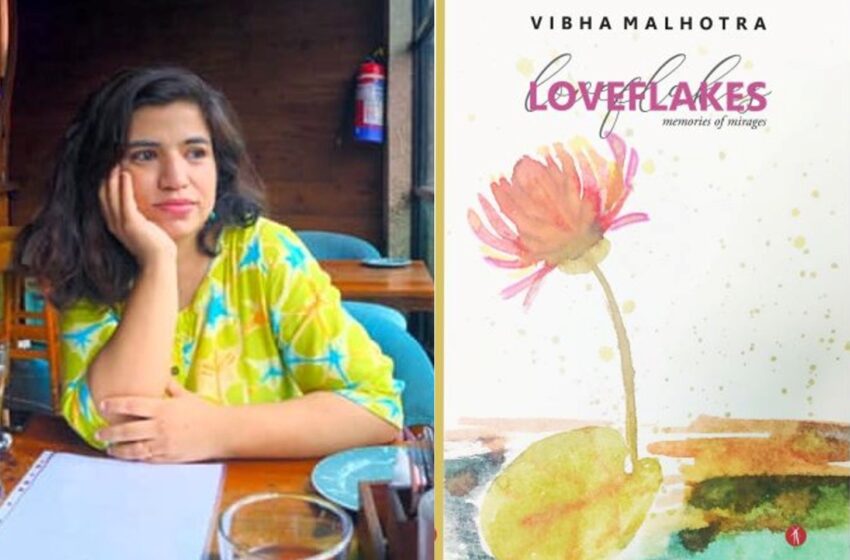‘Loveflakes’ is not just about love but hope, fear, insecurity & loss as well

Author Vibha Malhotra and her book
Rajkumari Sharma Tankha
Born and brought up in Delhi, Vibha Malhotra works as an engineering manager in a software organisation. But at heart, she is a writer, a poetess at that. Last month, she came out with a book of poems, Loveflakes: Memories of Mirages. Excerpts from an interview:
So how did a software engineer turn into a poetess?
I have taken a zig-zag path through life, delving both in Software Engineering and Creative Writing. As a result I hold a Bachelor’s in English Literature, Master’s in Creative Writing (from Newcastle University, UK), besides Master’s in Computer Application. Books and literature are my passion, so I find time to write.
I started writing poetry at a very young age – when I was in primary school. It wasn’t a conscious choice back then. One of the triggers I can possibly cite is that my father encouraged my sister and me to read from a very early age. He did this by reading a lot himself, subscribing to monthly books and magazines for us, and taking us to book fairs. This exposed me to stories and poems. I do not know why I chose poetry back then, but it just happened one day. And my parents always demonstrated a lot of faith in me. They encouraged me to submit my poems to the school magazine. They also cheered when I participated in the original poem recitation competitions organized by Ramakrishna Mission. So there never was any dearth of motivation. Since then, I have written short stories, book reviews, and non-fiction prose pieces as well, but it is poetry that comes to me most naturally.
Do you remember the first one you wrote?
I started writing poems early, so I cannot recall my first poem. But I remember, those poems had elements of nature in them, and almost always carried a moral lesson. Even after all these years, my poems still have a strong presence of themes pertaining to nature, whereas the moral lessons have disappeared. I guess this is part of growing up. You learn to accept the imperfections in the world and yourself and become more open to shades other than just black and white. My poems now are more about observations and conversations than about preaching a lesson. To give you an example of some of my early published poems, here’s an excerpt from Drifting with the Tyne, which I wrote in 2011 about the strange behaviour of the River Tyne, which appeared to flow backward during the day:
Mischievous waters murmur and slink back
wary eyes glinting and planning another prank
while the North Sea lashes its raging arms
against the rugged shores and banks.
Tell us about the making of this book.
In case of Loveflakes, the writing of it was a matter of persistence. I wrote the first of these prose poems back in 2019, and started reading them out to a set of beta readers to gauge their response. “We are homogenous” was the first piece that I read out to them.
That day when we first held hands, I felt our souls merge.
That moment was infinite. We were infinite.
Whenever we are apart, that infinity embraces me.
I still feel your hand in mine.
I still find your soul in me.
But then the pandemic struck in 2020 and with it came several shifts in perspectives that all of us had to accept and get used to. This was the time of some really strong emotions, but the writing slowed down. The mind space that I used to give to this project before the pandemic, now went into staying afloat. It took real physical effort during the past couple of years to continue writing about love in the backdrop of loss and trauma.
Was getting it published challenging?
Not exactly. Actually, in 2019, I was invited to an event at Oxford Bookstores to deliver a talk on “Manifestations of Personal Pathos in Contemporary Poetry”. It was here that I met Kiriti Sengupta and Bitan Chakraborty of Hawakal Publishers. We had worked together in the past when I was running Literature Studio, so we knew each other, but I had never discussed my work with them. I read out a few pieces to them and they were quick to spot the spiritual thread in these poems. They asked me to reach out to them when I had about 55 of such poems written.
So when by Feb 2022 I had 70 poems already written, I reached out to Hawakal. They remembered our conversation from 2019 and asked me to send over my manuscript. And from there on, the process was very fast and smooth, and in April 2022, I found myself holding a copy of Loveflakes.
All the poems in Loveflakes are love poems… is life all that lovey-dovey?
These poems are indeed all about love, but they are not about fairy-tale-like happily ever-afters. There are underlying themes of hope, fear, insecurity, loss, acceptance, disappointment, and also existential questions around life. There is longing in some and a sense of foreboding in others. Consider Inner Child, for example:
You appeal to the 15-year-old me.
She did not know heartbreak yet.
When I met you I met her again.
Here she is, ready to put her all into this,
with an abandon that
only the naïve are capable of.
When you are in love, you tend to experience all emotions sharply and when you lower your guards and surrender to your feelings, you put yourself at risk of heartbreak. And heartbreak continues to be the common tragedy that everyone goes through at some point in their lives. So, to answer your question, yes, all poems in Loveflakes are love poems, but life isn’t all that lovey-dovey, because love itself isn’t all that lovey-dovey. It is a risky roller-coaster ride that isn’t for the faint-hearted. It makes and breaks you at the same time.
Do you write on any other subject or only love?
I tend to dabble in a variety of topics. As I said earlier, nature is a constant theme. While I do not write about spirituality, some of my poems do have spiritual subtext that comes naturally because of my belief in our primeval synchronicity with the universe. I believe that human beings are universes in themselves, as are other living beings. So there are cosmic themes as well. You will find several poems that dwell upon human existence and how it mimics the cosmos. I have also written satire. For example, this very short poem published in Muse India in 2014:
On the tip of Mount Everest sits the sage
a skinny lotus in search of peace
He frowns again and pricks his ears.
A cricket chirps in the woods below.
I often draw from the memories of my childhood. I feel that nostalgia is a very potent concept for poetry. It has inherent beauty that translates nicely to verses.
Each poem carries an artwork. Are these art works done by you or someone else?
I have collaborated with two very talented artists, Bharati Malhotra and Poonam Bhalla, who were generous enough to allow me to sift through their artwork and select the pieces that go with my poems. I am eternally grateful to them for this.
Any other book in the offing
I am working on another collection of prose poetry.



1 Comment
Thank you “Life and More” for publishing this interview. Though Vibha and I have known each other for a really long time, sometimes reading an Interview often makes you feel as if you are reading about someone else :-). Kind of knowing more from a different person’s eyes.
Very nicely done, Rajkumari and team. Thanks again.